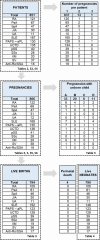Management of pregnancy in autoimmune rheumatic diseases: maternal disease course, gestational and neonatal outcomes and use of medications in the prospectiveItalian P-RHEUM.it study
- PMID: 38663885
- PMCID: PMC11043763
- DOI: 10.1136/rmdopen-2024-004091
Management of pregnancy in autoimmune rheumatic diseases: maternal disease course, gestational and neonatal outcomes and use of medications in the prospectiveItalian P-RHEUM.it study
Abstract
Objectives: To investigate pregnancy outcomes in women with autoimmune rheumatic diseases (ARD) in the Italian prospective cohort study P-RHEUM.it.
Methods: Pregnant women with different ARD were enrolled for up to 20 gestational weeks in 29 Rheumatology Centres for 5 years (2018-2023). Maternal and infant information were collected in a web-based database.
Results: We analysed 866 pregnancies in 851 patients (systemic lupus erythematosus was the most represented disease, 19.6%). Maternal disease flares were observed in 135 (15.6%) pregnancies. 53 (6.1%) pregnancies were induced by assisted reproduction techniques, 61 (7%) ended in miscarriage and 11 (1.3%) underwent elective termination. Obstetrical complications occurred in 261 (30.1%) pregnancies, including 2.3% pre-eclampsia. Two cases of congenital heart block were observed out of 157 pregnancies (1.3%) with anti-Ro/SSA. Regarding treatments, 244 (28.2%) pregnancies were treated with glucocorticoids, 388 (44.8%) with hydroxychloroquine, 85 (9.8%) with conventional synthetic disease-modifying anti-rheumatic drugs and 122 (14.1%) with biological disease-modifying anti-rheumatic drugs. Live births were 794 (91.7%), mostly at term (84.9%); four perinatal deaths (0.5%) occurred. Among 790 newborns, 31 (3.9%) were small-for-gestational-age and 169 (21.4%) had perinatal complications. Exclusive maternal breast feeding was received by 404 (46.7%) neonates. The Edinburgh Postnatal Depression Scale was compiled by 414 women (52.4%); 89 (21.5%) scored positive for emotional distress.
Conclusions: Multiple factors including preconception counselling and treat-to-target with pregnancy-compatible medications may have contributed to mitigate disease-related risk factors, yielding limited disease flares, good pregnancy outcomes and frequency of complications which were similar to the Italian general obstetric population. Disease-specific issues need to be further addressed to plan preventative measures.
Keywords: antirheumatic agents; arthritis; autoimmune diseases; connective tissue diseases; systemic vasculitis.
© Author(s) (or their employer(s)) 2024. Re-use permitted under CC BY-NC. No commercial re-use. See rights and permissions. Published by BMJ.
Conflict of interest statement
Competing interests: None declared.
Figures



References
-
- Andreoli L, Chighizola CB, Iaccarino L, et al. . Immunology of pregnancy and reproductive health in autoimmune rheumatic diseases, update from the 11th international conference on reproduction, pregnancy and rheumatic diseases. Autoimmun Rev 2023;22:103259. 10.1016/j.autrev.2022.103259 - DOI - PubMed
-
- Andreoli L, Bertsias GK, Agmon-Levin N, et al. . EULAR recommendations for women’s health and the management of family planning, assisted reproduction, pregnancy and Menopause in patients with systemic lupus erythematosus and/or Antiphospholipid syndrome. Ann Rheum Dis 2017;76:476–85. 10.1136/annrheumdis-2016-209770 - DOI - PMC - PubMed
Publication types
MeSH terms
Substances
LinkOut - more resources
Full Text Sources
Medical
Research Materials
